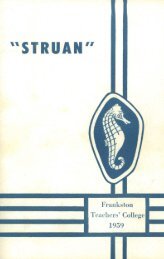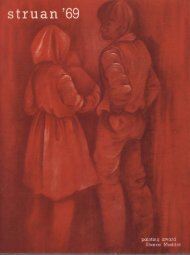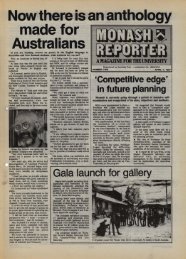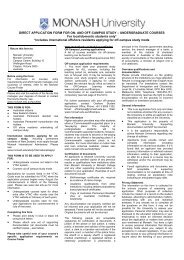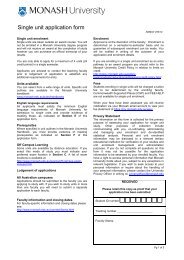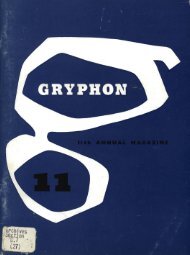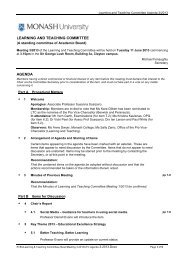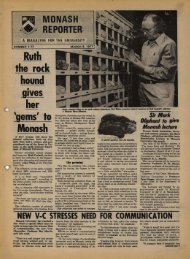Struan 1961 - Adm.monash.edu
Struan 1961 - Adm.monash.edu
Struan 1961 - Adm.monash.edu
Create successful ePaper yourself
Turn your PDF publications into a flip-book with our unique Google optimized e-Paper software.
The crowd maintained a strong silence. Thenonto the pier was marched a captured partisan.He was unbound and commonplace in features.His hair was dark and unkempt. His clothes werecivilian. Though no sound had been uttered itwas plain that he was to be executed.I felt the weight of anticipation about me, butslow anticipation for the quiet of the crowd wasalmost . nonchalant. After all, what was oneexecution? This type of thing happened everyday in war.The woman proceeded methodically. Shedirected the prisoner to the far edge of the jettyand prepared to eliminate him .Suddenly, one of the officers, dressed in peakedcap and khaki greatcoat, strode briskly on to thepontoon and out to the condemned man. Hehanded him a rifte and pointed to the expectantwoman.This unexpected move seemed to stun everyoneinto an even deeper silence - all, that is, exceptthe partisan who seemed to have expected it.He calmly raised the weapon, cocked it andlevelled it at the numbed woman. It was a LeeEnfield in make and .303 in calibre.Suddenly the realisation that she was the victimof a cruel trick registered in the woman'sbrain. She shuddered; I almost felt the coldstab in my own body. She whimpered, thenturned to run. However, as she came near theedge of the pontoon, she stumbled and toppledover into the water, hitting with hardly a splashas does sixpence when dropped in a pot ofcauliflower sauce. She sank straightaway.The partisan, the officers and the crowd fring ing the lake stood impassively watching - yet theyfelt no anguish. They had learned no horror ofwar!Then occurred something which grabbed ateveryone's throat with the force of a drowningman's last grasp for life. Rising thickly to thesurface, as tomato sauce does in sausage gravy,came deep contrasting crimson blood , up throughthe satanic mire. For the first time the vacuumof silence was broken. A shocked and horrifiedwoman's voice gasped, "the baby!"We all felt inside the pain the mother musthave suffered when she fell to the water, pulpingthe unborn infant.Moments later the poor creature surfaced, cryingout in pain and sobbing; the crowd groanedsoftly, and swayed back on its feet as one .The wretched woman turned and through hertears saw the partisan who was kneeling at theedge of the jetty. She began to swim towardshim, begging, pleading with him to shoot her. Heraised the rifle for the second time . She stoppedswimming to give him aim and mercifully hesent off a shot that struck her in the chest.She emitted a choked rattle from the back ofher throat and rolled over, face down , amidclouds of blood in the water.We all felt hollow inside: in a matter of secondsa life which was once capable of love and hateand oth er earthly things had ceased, violently, toexist.The crowd felt relief - but for themselves,not the woman. They had suffered. Some werebeginning to hate war - only some.Then, as if to pour acid into the wound, thebody began to writhe again.Page Ten .At the far end of the jetty was the officer whohad given the rifle to the partisan. He wasdoubled upon one knee, vomiting. I wanted tounderstand how he felt, but I couldn't. Heturned and looked at me; I recognised his faceimmediately - it was mine . The officer was me.REACTION TO MAY 19thThe large central library was like a sanctuary.It protected its inmates from the more mundaneproblems of the outside world. It could be rainingheavily outside, it could be snowing, there couldbe rioting in the streets but the atmosphere insideremained calm and resolutely unruffled, On enteringits walls the uninitiated was struck almost physicallyby the near opressive silence of the room andits austere aloof air.The reason for this unnatural silence was a com bination of the fierce dedication of the people whocame there to work-and the chief librarian. Itwas the latter who, so to speak, set the standardas he sat regally on his high throne in the centreof the room, glaring tyranically at anyone who daredto break the constant silence. Nobody could everremember seeing him laugh or even smile; in factnobody could ever distinctly remember him ex:.press any recognizable human emotion other thana strong but rather objective, contempt for mankindin general.As the ten o'clock siren sounded, the last of thesilent readers moved noislesly from the roomleavingits hallowed chamber, feeling stronglyelevated-as if some small fragment of the learningthat crowded the walls had touched them as theypassed.Eventually the meticulous workers of the libraryhad all departed-peculiar in their manner whichwas so uniform. They did not speak but walkedsilently out of the library, silently down the stairsand then silently disappeared into the night tolive a few hours of the life they enjoyed so silently.The chief librarian was the last to leave. He carefullychecked over his day's work; tallied whateyerchief librarians tally; re-arranged the already tidydesk and then carefully, jumped down, strode pastthe first table threw back his head and shoutedthe words of'a current hit tune-loudly, joyfullyand just slightly off key.From the shelves, the thousands upon thousandsof beautifully bound mellowed books looked down- and shuddered.Wendy Devenish.FROM A TRAINThe scenes rush by and so do I,Each changes in a wink.They cannot stay, not once all day,All I can do is blink.There might have been some lovely sceneThat pen or brush could catch,But once it comes and once it goesNo paper will it match.So 'tis with life and all its strife,All gone within a flash,We cannot hold that glimpse of oldWithout a lasting clash.Experience new distorts the viewAnd that first scene is lost .-ANNE LEESTRUANit



